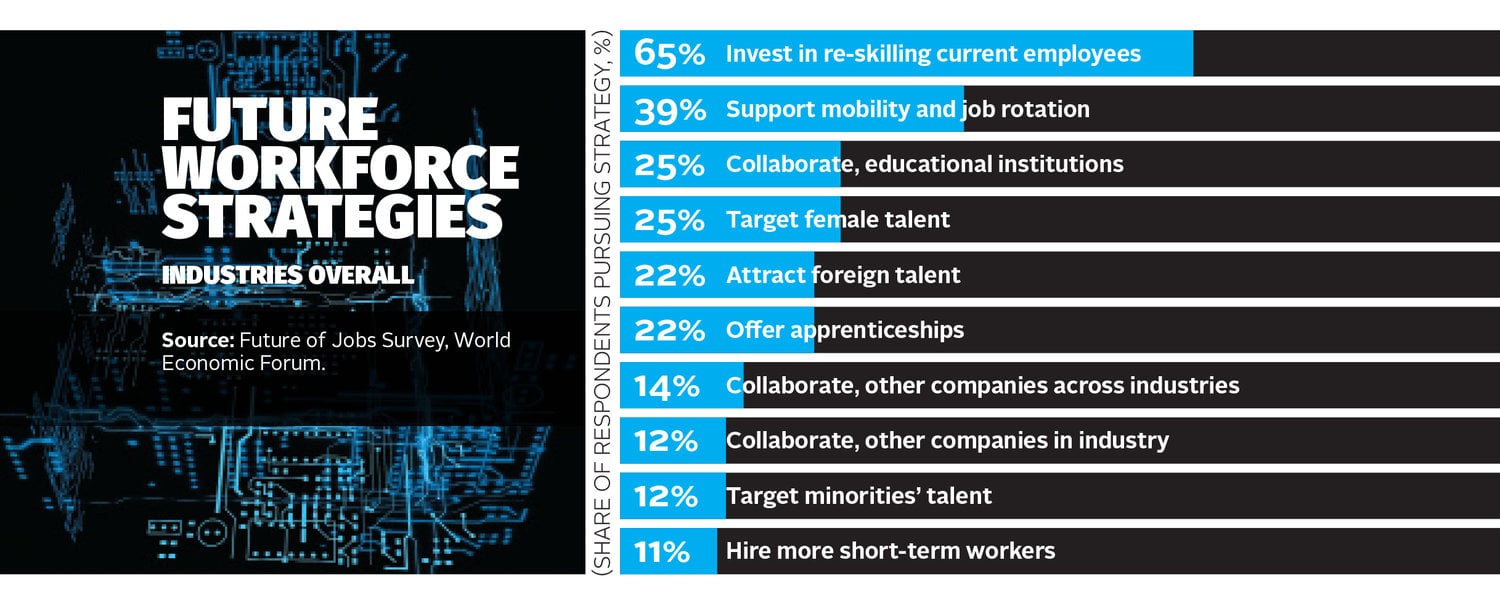
by Michael J. Pallerino
You might want to sit down for this. In its “Future of Jobs” report, the World Economic Forum predicts that millions of jobs will be lost before 2020, as artificial intelligence, robotics, nanotechnology and other socio-economic factors replace the need for human workers.
It’s a lot to take in. But there is some good news (if you can pick yourself up off the floor). These same technological advances also will create a few million new jobs. And here’s the catch – many of the new jobs will be in more specialized areas such as computing, mathematics, architecture and engineering.
And all of those manual and clerical workers who may find themselves out of work? They most likely will not have the required skills to compete for the new roles.
This is the type of conversation that Daniel Burrus has a lot. Considered one of the world’s leading futurists on global trends and innovation, Burrus is a strategic advisor to executives from Fortune 500 companies. On any given day, he will help develop game-changing strategies based on his proven methodologies for capitalizing on technology innovations and their future impact.
As he looks out over the Fourth Industrial Revolution that already is gaining steam, Burrus sees a world that’s changing on a dime, only to stop, and then change again. As the three accelerators (bandwidth, processing power, and storage) grow at an exponential pace, Burrus says new positions are emerging in the tech sector, and traditional jobs are getting tech-related overhauls. This means the skills required to do these jobs are always changing.
The solution: It’s up to both employees and employers to keep up with these trends.
“When it comes to the future of your industry, how secure do you feel, not only in your position, but in your career, your abilities, as a whole?” Burrus asks. “The era in which a professional could go to school for a specific skill or trade, develop his or her acumen and skills, and stick with that skill set to establish and grow a career until retirement has passed. Now, the future of your career doesn’t depend on whether employment is available at any given company; it depends on just how employable you are.”
And that requires constant learning, being proactive in making sure the skills you have fit the market in its current state, as well as its varied demands for employees with up-to-date skill sets.
“We’re living in transformational times, and if your job description isn’t already changing, it probably will in the near future,” says Burrus, author of T and T best-selling “Flash Foresight” and “Technotrends.” “You can’t afford to stand still in your career, as many used to in generations past. You can’t simply coast along and be complacent in terms of not pursuing more training or a better education tailored to the skills you’ll find yourself needing sooner rather than later.”
The bottom line is pretty clear cut: To stay competitive, your company must anticipate the most significant technology trends shaping your business and changing your customer, and then develop innovative ways to use them to your advantage – both inside and outside of your organization.
And, as Burrus warns, if it can be done, it will be done. If you don’t innovate and use these technologies to create a competitive advantage, someone else will. “For both employees and employers, education is key,” he says. “Prospective employees need to continuously augment their skill sets and pick up new hard and soft skills in order to remain employable.”

Getting Ahead of the Curve
In today’s increasingly technological world, disruptive changes to business models continue to profoundly impact the employment landscape. According to the “Future of Jobs” report, many of the major transformation drivers currently affecting global industries will continue to significantly impact jobs, ranging from significant job creation to job displacement, and from heightened labor productivity to widening skills gaps.
In the rapidly changing employment landscape, the ability to anticipate and prepare for future skills requirements, job content and the aggregate effect on employment falls on today’s leaders.
In his book, “Jobs to be Done: A Roadmap for Customer-Centered Innovation,” Stephen Wunker says that in a challenging economy filled with nimble competitors, no one can afford to stagnate.
“It’s a big mistake to focus on organizational functions as they’re defined today,” says Wunker, managing director of New Markets Advisors, a boutique consulting firm that helps uncover customer needs and chart innovative paths to growth. Wunker and his team work closely with Harvard Business School Professor Clayton Christensen, highly regarded as one of the world’s top management thinkers, to build consulting practices based on his research.
Wunker says leaders must think about the key things their company is trying to accomplish and how executing on those goals will change in future years. For example, the need to connect with consumers directly has been a long-standing need, but the means of doing it has shifted from direct mail to e-mail to social media.
“The long-term needs are usually very consistent, and can cross functional silos,” Wunker says. “The capabilities required for execution can change, but often in predictable ways.”
Operation Re-Skill
In its report, the World Economic Forum said that without urgent and targeted action today to manage the near-term transition and build a workforce with future-proof skills, businesses will have to face the reality of shrinking consumer bases.
So, what paths should leaders be acquiring to make sure they have value as innovation marches forward?
“Every leader must understand that we live in an economy that is constantly changing because the consumer is constantly evolving,” says Eliakim Thorpe, a highly recognized entrepreneurial thought leader and creator of the T.H.R.I.V.I.N.G. Organization: A New Philosophy to Transform Organizations.
Thorpe says that company innovation, advancing technology, consumer habits and global economic forces are rapidly reshaping the labor landscape, which requires leaders to be fully versed on how to get in front of the job curve.
”What’s truly required is a visionary leader who is very skilled in leveraging the whole organization to understand the labor market,” says Thorpe, who has worked with and consulted for Fortune 10 to Fortune 500 companies such as IBM, Whirlpool and GM. “This leader must leverage his CFO, HR department, operational best practices, to measure workforce needs. He must also leverage a robust Information Technology ‘ecosystem’ that has the ability to access company performance data, crucial economic and job market data via its information technology infrastructure and other external job/economic indicators.”
In addition, Thorpe believes today’s leaders must be completely engaged with the workforce needs of their organizations based upon company goals and strategic direction. Leaders must develop a collaborative organization that is skilled in research, recruiting, retention and understanding of how government regulations affect emerging markets and the economy.”
Some schools of thought suggest that employers overhaul best practices in areas like recruiting. Why not make your organization a destination for valued talent with a culture of learning and employee encouragement?
“For both employees and employers, education is key,” Burrus says. “Prospective employees need to continuously augment their skill sets and pick up new hard and soft skills in order to remain employable. Employers facing a talent shortage need to develop new recruiting methods and be willing to provide necessary additional training to new hires. From both sides, it’s clear that the most important aspect of this talent and employment shortage is the pursuit of modernized knowledge.”
